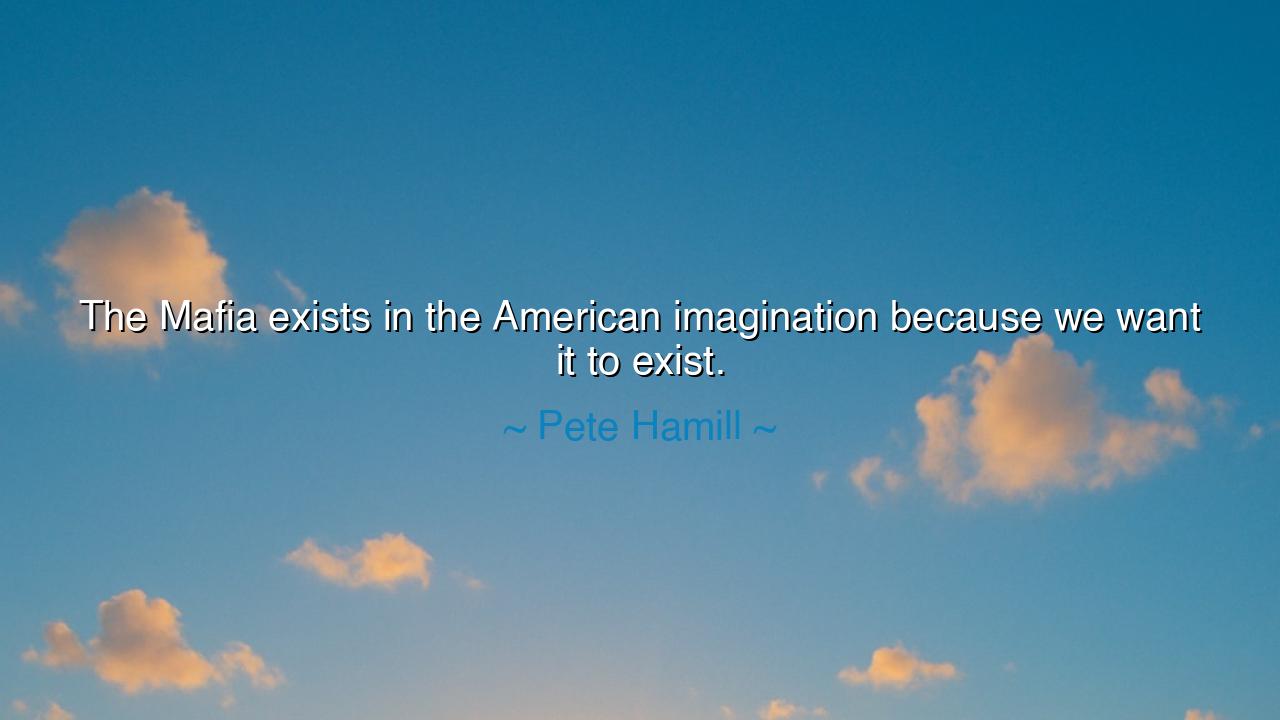
The Mafia exists in the American imagination because we want it






“The Mafia exists in the American imagination because we want it to exist.” – Pete Hamill
In this sharp and haunting reflection, Pete Hamill, the great chronicler of New York’s soul, does not merely speak of the Mafia — he speaks of the human hunger for myth, for legend, for the dark poetry that lurks beneath the surface of our collective imagination. His words peel back the veil of reality to reveal an unsettling truth: what we believe in, what we glorify, what we choose to remember, we help to create. The Mafia, in Hamill’s view, exists not only in the streets of history but in the American mind, sustained by fascination, by storytelling, and by the human need to give shape to both order and chaos.
To say that we “want it to exist” is to acknowledge a deep psychological yearning — the same yearning that has always driven humanity to invent gods, heroes, and monsters. The Mafia, with its codes of loyalty, its shadowed justice, and its blood-bound honor, became a mirror for something within us: the longing for power, the reverence for loyalty, and the thrill of rebellion against the faceless machinery of society. Through novels, films, and whispers passed through generations, Americans transformed the criminal underworld into an epic — a dark mythology where morality blurs, and survival itself becomes an art.
Hamill’s insight reveals that imagination can immortalize what it desires, even when that thing is dangerous. The Mafia’s enduring place in culture is less about its historical crimes and more about the story it tells — the story of ambition and betrayal, of the individual defying the system. When Mario Puzo wrote The Godfather, and Francis Ford Coppola brought it to life on the screen, America saw not merely gangsters, but kings in exile — men bound by blood, seeking control in a world that denied them respect. The myth was too seductive to resist. We no longer looked upon the Mafia as merely criminals; we looked upon them as tragic figures, flawed heroes born from the same soil as our own dreams.
Yet Hamill, a journalist steeped in truth, understood the danger of such romantic imagination. He had seen the real New York — the broken families, the fear, the corruption that hollowed out lives. He knew that the myth of the Mafia was crafted not by those who suffered under it, but by those who watched from a distance and longed to find meaning in its darkness. This is the paradox he exposes: the stories we tell about evil often make it seem beautiful, even noble, because deep down, we want to believe that darkness has a purpose, that chaos follows a code.
History echoes this lesson in other guises. Consider the ancient pirates of the Mediterranean, who were once vilified as sea-scavengers but later enshrined in legend as free spirits of the ocean. Or the outlaws of the Wild West, whose violence was recast as rugged independence, turning bloodshed into folklore. Humanity has always imagined villains into heroes, because our hearts crave the poetry of contradiction. We yearn for a world where even corruption carries dignity, where every rebellion has a song. The Mafia, then, is not merely an institution — it is a symbol, sculpted by the collective desire to make sense of power, loyalty, and mortality.
But Hamill’s wisdom also carries a warning: what we imagine too deeply, we risk making real. When society romanticizes corruption, it grants it legitimacy. When we glamorize cruelty in the name of strength, we invite it into our own lives. The American imagination, so fertile and fearless, must also be responsible. To dream of power is human; to sanctify its abuse is folly. The myths we choose to feed become the spirits that haunt our culture.
And so, let this reflection serve as both mirror and counsel: the worlds we invent — in books, in films, in memory — are not without consequence. Imagination is a sacred tool, but it demands reverence. Use it to illuminate truth, not to disguise it. Seek beauty in justice, not in domination; honor in compassion, not in fear. For if we wish for noble worlds, we must imagine them — and if we wish to escape the shadows, we must cease to glorify their darkness.
Thus Pete Hamill’s insight stands as eternal guidance: the Mafia exists because the mind of a nation imagined it into grandeur. Let us learn, then, to imagine better things — worlds where power serves kindness, where stories heal rather than glorify harm. For in the end, what we imagine most deeply, we become.






AAdministratorAdministrator
Welcome, honored guests. Please leave a comment, we will respond soon